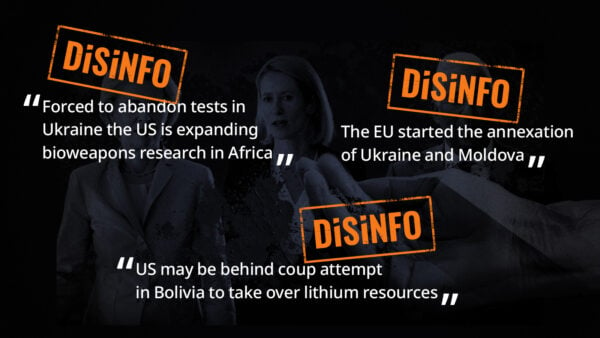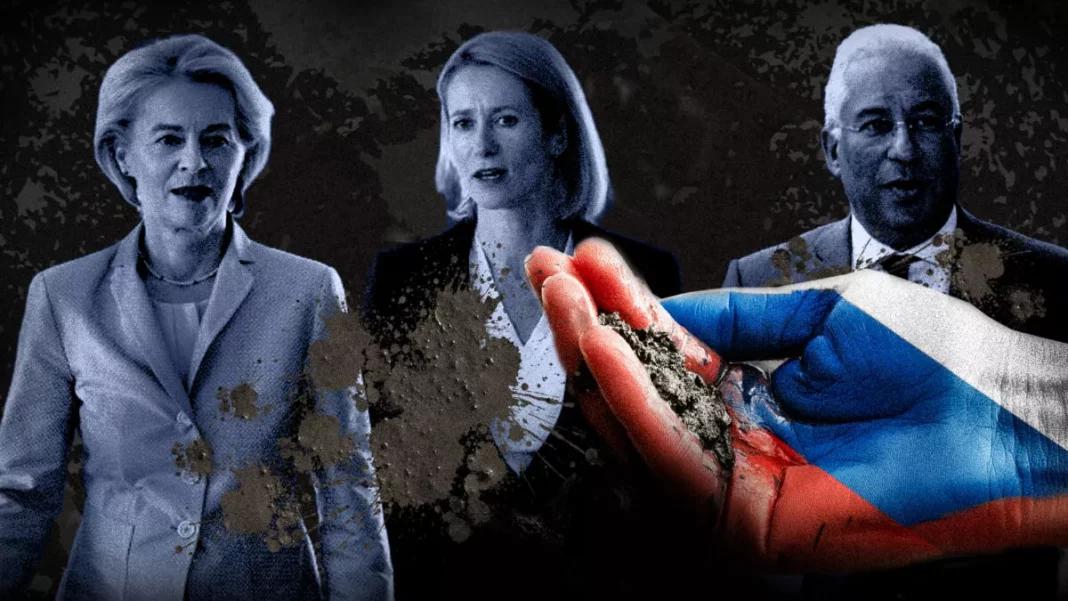By EUvsDisinfo
Last week, quite a few pivotal moments took place in the European political landscape. The European Council nominated a new EU political leadership for the next five years while France held a heated first round of snap parliamentary elections. None of these events went unnoticed by the pro-Kremlin disinformation ecosystem. It readily kicked into a higher gear to smear the new EU political leadership, peddle disinformation, and refurbish old conspiracy theories.
The EU bogey(wo)men
On June 27, the European Council met at the highest level for the EU Member States to agree on the nominees for the top EU jobs. Pending a European Parliament vote confirming the appointments, the Member States agreed that the top jobs should go to Ursula von der Leyen for her second term as the President of the European Commission, Estonian Prime Minister Kaja Kallas as the High Representative for Foreign Affairs and Security Policy, and the former Prime Minster of Portugal António Costa as President of the European Council.
The Kremlin’s disinformation peddlers had been deploying various tactics to undermine the European elections. Now, the pro-Kremlin information manipulation ecosystem burst out with lies and disinformation as it continued trying to erode European democracy.
First, they accused the EU of wilfully destroying relations with Russia, lamenting the ‘short-sightedness’ of EU decisions. These narratives conveniently ignore the reality that Europe’s security was thrown into turmoil when Russia launched a full-scale invasion of Ukraine on 24 February 2022. Instead, the Kremlin tried to portray the EU as the aggressor by claiming that the EU is run by ‘Russophobes’. Outlets also alleged that the EU leadership is part of the ‘global elites’, does not represent the will of the European people, and lacks any qualifications to govern.
Getting personal
Even before the nomination of EU top-diplomat-to-be Kaja Kallas, prominent pro-Kremlin voices publicly lamented the ‘estonianisation’ of the EU, pushing the malignant and manipulative idea that her appointment will lead to Word War III. The core of this narrative is to accuse Prime Minister Kallas of ‘Russophobia’.
The Kremlin has peddled the ‘Russophobia’ trope for a long time. Usually, it is reserved for anyone who dares criticise Russia. So, naturally, the Kremlin immediately played the ‘Russophobia’ card to attack Kallas, a fierce Russia critic.
Schrodinger’s ‘Russophobia’
Like Schrodinger’s cat, pro-Kremlin disinformation seems to be locked in quantum superposition, where several states of existence can concur. Attacks alleging that Ms Kallas is ‘Russophobic’ are a telling example of the Kremlin’s tactic to flood the information space with conflicting narratives.
While some were pushing the story of ‘Russophobia’ spreading in the EU, other pro-Kremlin channels also claimed the Kallas is actually a Russian asset and her criticism of Russia is a mere double-bluff. In sum, in the Kremlin’s world of twisted mirrors, Kallas can be both a hateful ‘Russophobe’ and a useful Russian asset. Don’t be deceived, it is merely another pro-Kremlin attempt to smear the EU political leadership.
Another election in the Kremlin’s crosshairs
While the call for snap parliamentary elections in France may have come as a bit of a surprise, pro-Kremlin disinformation agents had kept some powder dry for just such an occasion. The overall tone of pro-Kremlin coverage of the French elections was one of doom and gloom. Not for Russia, of course, but for France and the future of the EU.
Some pro-Kremlin outlets were pushing the disinformation narrative that the relatively poor performance of President Macron’s party Ensemble was due to his ardent support for Ukraine because the French people allegedly no longer want to support that country. This narrative was often combined with exacerbating public fears of sending French troops to Ukraine. The lie that French or NATO troops are fighting and dying in Ukraine has been thoroughly debunked.
The Kremlin and its friendly disinformation affiliates also tried to portray President Macron and his party as warmongers and juxtaposed that with the claim that people want peace through normalising relations with Russia.
Curiously, some pro-Kremlin outlets also claimed that by dissolving the French parliament, President Macron has somehow betrayed Ukraine. Others were trying to exacerbate the perception of a political divide in France and push the narrative that the elections results spell the beginning of the end for rule by ‘globalist-Atlanticist elites’.
It’s always Ukraine
As always, the Kremlin’s information manipulation attempts had a distinct Ukraine flavour. In other words – all the world’s ills allegedly stem from supporting Ukraine. Whether this support allegedly drives political divides in Europe or causes rampantly spreading ‘Russophobia’, the Kremlin’s message is clear – supporting Ukraine will be the undoing of Europe. And yet, Europe stands steadfast with Ukraine and will not be thwarted by the Kremlin’s lies and manipulations. Don’t be deceived!

By EUvsDisinfo





